While I don't have permission to reprint the following editorial from today's New York Times, I want to share it anyway. It's a nice companion, really, to my previous post about becoming used to a new "norm"--one that no one should have to become used to. So, here it is:
January 30, 2006
Editorial
Louisiana in Limbo
"New Orleans waits. While some heroic efforts at rebuilding are taking place, hundreds of thousands of residents have put their lives on hold until they know what the government's next steps will be, leaving the shells of their houses as placeholders. But the Bush administration has now rejected the most broadly supported plan for rebuilding communities while offering nothing to take its place.
It has been five months since Hurricane Katrina struck the Gulf Coast and for many the norm is still the claustrophobic new reality of tiny trailers and multiple families crammed into single apartments. Louisiana is trying. You can hear jackhammers pounding and buzz saws whirring on Canal Street in New Orleans. Dedicated workers endure a grinding daily commute from points north, like Baton Rouge, as they try to make the city and the region whole again. But the mission is far from complete and the challenge is beyond the scope of a broken city and a poor state.
New Orleans's crisis has little relation to anything the nation has faced in modern memory, and traditional solutions will simply not help. Homeowners — many very poor people whose houses had been in their families for generations — had varying degrees of insurance before the disaster. When entire neighborhoods are devastated, their mildewed furniture and drywall piled on the roadsides, it's impossible to tell the people who are well insured to rebuild and hope that the houses all around them will somehow be reclaimed somewhere down the line.
But the Bush administration refuses to support the plan of Representative Richard Baker, Republican of Louisiana, which would give everyone the capacity to rebuild and which had the backing of the mayor, the governor and the state's Congressional delegation. (To add insult to injury, two days after the White House shot down Mr. Baker's proposal, President Bush suggested at a news conference that Louisiana's problem was the lack of a plan.)
Instead of an alternate solution, the president's Katrina czar, Donald Powell, has offered sleight of hand, touting $6.2 billion in development money for Louisiana passed last year by Congress as if it were somehow a substitute. And in an attempt to narrow the scope of the problem, Mr. Powell says the government first needs to care for the roughly 20,000 homeowners without flood insurance who lived outside the federally designated flood plain. The real tally of destroyed or damaged homes in the region is well over 200,000. And the real need is housing for residents, whether they were renters or owners, insured or uninsured, living above the flood plain or trusting the federal government's levees to protect them from storms.
Perhaps too much emphasis has been placed on the wreckage of poor, low-lying New Orleans neighborhoods like the Lower Ninth Ward. That has sparked the unproductive, blame-the-victim debate revolving around whether people should have lived there in the first place. The Ninth Ward provides a misleading picture of the city, as do the relatively unscathed tourist areas like the French Quarter and the Garden District. Huge swaths of the city have the empty quality of a ghost town. Stores wait for residents to reopen; residents wait to see if neighbors will return. The city and surrounding parishes will not meet Mr. Powell's neat categories, when renters lived beside owners, insured next to uninsured. He is talking like an actuary when a leader is needed to rescue this region.
Now, Congress has a responsibility to follow its own lead rather than the president's. We were outraged once, shocked at the images on our television sets, at the poverty in our collective backyard and at the devastation of a great city. As the disaster threatens to become permanent, we have every reason to remain so."
Monday, January 30, 2006
Saturday, January 28, 2006
I am tired of writing about aftermath, and sad that there is one.
I cried over it this morning. I hadn't cried about it in a while. I was reading this article in the Washington Post, called "Post-Katrina Promises Unfulfilled," and got to this part:
"Beyond levees and housing, the region faces other huge challenges, Powell said, including jobs, schools and health care. One in every five Louisiana prime-rate mortgages is 30 days or more past due. One in six adults is unemployed. Only 15 percent of schools and 32 percent of hospitals are open in Orleans Parish, and one in three grocery stores and restaurants in the region are open."
And I realized that while I hadn't known the numbers, this wasn't news to me--that I'd grown accustomed to it, in fact--like my pre-Katrina, fatalistic self.
It is so easy to become fatalistic, though, when you are reminded, repeatedly--by the lack of response from the government, by the lack of change, by the daily-ness of making things happen in a city that still doesn't work--that this city will never be what it once was.
It is easy, too, when you know that most people out there haven't a clue, and frankly, don't much care to.
I have grown accustomed to the change. To the lack of change.
What does that say about who we are, as a country, and who I am, as a person, that those who don't live here have stopped caring, and that we, who do live here, have learned to deal?
In fact, so much of this aftermath has become like wallpaper. Wallpaper isn't the right word for it. I can't describe how it feels, really, to become used to a city in this state.
The news, the ads, the billboards--are all about rebuilding. There is a channel on cable devoted entirely to slide shows of devastation. There is my drive to work, where I am annoyed, now, by endless construction and orange cones. There is the way in which we avoid talk of homes and futures, particularly around our friend, Kim, who lost everything and has picked up smoking again. There is our anger, which has grown old and barely registers, these days. There is the banging, in the morning (and all day), of Mexican contractors repairing next door. My soundtrack. My alarm.
And still. I love this city like I can't even say. And I hate my president for lying. Again. God help us!
I cried over it this morning. I hadn't cried about it in a while. I was reading this article in the Washington Post, called "Post-Katrina Promises Unfulfilled," and got to this part:
"Beyond levees and housing, the region faces other huge challenges, Powell said, including jobs, schools and health care. One in every five Louisiana prime-rate mortgages is 30 days or more past due. One in six adults is unemployed. Only 15 percent of schools and 32 percent of hospitals are open in Orleans Parish, and one in three grocery stores and restaurants in the region are open."
And I realized that while I hadn't known the numbers, this wasn't news to me--that I'd grown accustomed to it, in fact--like my pre-Katrina, fatalistic self.
It is so easy to become fatalistic, though, when you are reminded, repeatedly--by the lack of response from the government, by the lack of change, by the daily-ness of making things happen in a city that still doesn't work--that this city will never be what it once was.
It is easy, too, when you know that most people out there haven't a clue, and frankly, don't much care to.
I have grown accustomed to the change. To the lack of change.
What does that say about who we are, as a country, and who I am, as a person, that those who don't live here have stopped caring, and that we, who do live here, have learned to deal?
In fact, so much of this aftermath has become like wallpaper. Wallpaper isn't the right word for it. I can't describe how it feels, really, to become used to a city in this state.
The news, the ads, the billboards--are all about rebuilding. There is a channel on cable devoted entirely to slide shows of devastation. There is my drive to work, where I am annoyed, now, by endless construction and orange cones. There is the way in which we avoid talk of homes and futures, particularly around our friend, Kim, who lost everything and has picked up smoking again. There is our anger, which has grown old and barely registers, these days. There is the banging, in the morning (and all day), of Mexican contractors repairing next door. My soundtrack. My alarm.
And still. I love this city like I can't even say. And I hate my president for lying. Again. God help us!
Thursday, January 26, 2006
After being assigned what is surely the worst teaching schedule I've ever been assigned (three comps, two online courses, a lit course I've never taught before, and four separate preps,) I wasn't in the mood to get the following email. The email is in reference to the hundreds of displaced UNO faculty, staff, and students--among them, my dear friend and colleague, Kim, who lost her newly-bought Gentilly home. As I've mentioned before, the areas surrounding UNO are devastated. Nearly entirely. The drive to campus is chilling. And here I was whining about my schedule.
I was preparing a syllabus when the email came, and I read it out loud to Simon. We laughed incredulously, 'though it made me feel more like crying (one has to find alternatives to that if one is to stay sane.)
This email demonstrates the abomination that has been FEMA's response to Katrina. That the University of New Orleans--on the eve of a new semester--would have to send out a plea to its own alumni and faculty to house its own----!!!
Incidentally, FEMA has continued to call me and offer assistance EVEN AFTER I withdrew from the housing assistance program. (We'd returned to New Orleans and learned that our home was okay, so we withdrew. So we're not all leaches or low-lifes as the media may have you believe.) They have also offered trailers to friends whose homes were unscathed, while others whose homes were destroyed have waited and waited and continue to wait, still. This is five months after Katrina.
But, BEFORE I SHARE THIS EMAIL, I want to say that I worry, dear readers, that you will turn your backs on us--that you will read about the disaster that is FEMA and the clown that is our mayor and decide that we are not worth the nation's money and effort.
WE ARE! And we need you now--five months later--more than ever!
So here it is: the email that I CANNOT BELIEVE I received:
To: UNO Faculty, Staff, Students, Alumni, and Friends of UNO
From: Bobby L. Eason, Ed.D. Assistant to the Chancellor
Date: January 26, 2006
Subject: We need beds
The University of New Orleans needs your help. We want you to consider opening your home to one or more UNO faculty/staff/students (FSS) for a brief period of time.
Here is our plight. As promised to us by FEMA, trailer housing was scheduled to arrive in January for UNO’s displaced faculty, staff, and students (FSS). They have been delayed. We turned to “bridge” housing in hotel rooms, again recommended by FEMA. Now FEMA will not allow hotels to accept UNO FSS under the reimbursement program. We are appealing this decision to the highest level. In the meantime, many of our FSS do not have a bed for sleeping and school begins this Monday.
If you want to help, please respond immediately to the following:
I will accept one or more faculty members in my home (indicate how many).
I will accept one or more staff members in my home (indicate how many).
I will accept one or more students in my home (indicate how many).
I will accept a combination of faculty, staff, and students in my home (indicate how many and what combinations).
I am aware that student trailers will be ready late February and faculty/staff trailers late March. I am willing to have a UNO guests(s) in my home for (one week, two weeks, three weeks, four weeks, as long as the need exist, etc. Let us know how long your bed will be available.)
I am aware that some of the FSS have families. (Let us know your preferences, e.g., single persons only, husband and wife only, families with children O.K.)
Please indicate any restrictions that you wish to mention. (I am interested in non-smokers only. Smokers O.K., but must smoke outdoors. Smokers O.K.) All guests that smoke will be instructed to smoke out of doors.
I am aware that some individuals have pets. (Indicate your preference, e.g. I will accept guests with pets, it depends on the pet, no pets please.)
I am aware that many FSS are international. (I prefer international guests. I prefer traditional U.S. guests. I have no preference.)
I will open my home for a bed, but I will need some level of monetary compensation from my guests to defer utility and other expenses. (Please answer in any way that you wish.)
I am aware that meals are an issue. (I will provide a bed, but not food. I will provide a bed and meals. I will not provide meals, but will provide kitchen access. I will work out the meal situation with my guests.)
I am aware that some FSS may not have transportation to UNO. (I will be able to provide partial transportation to UNO. I will not be able to provide any transportation. I will discuss transportation with my guests.)
Indicate any other concern or restriction that you have.
I want to provide beds, but there are times when my guests must find other places to stay because of extenuating circumstances (leaving for Mardi Gras, have other guests coming in from out of town, etc.—please indicate)
In addition to above, if you are willing to share one or more beds, please provide the following:
Name ___________________________________
Phone ________ ___________ __________________
Cell phone ________ ___________ __________________
E-mail ______________________________________
Address ______________________________________
f. Other ______________________________________
Please e-mail, call, or personally contact Bobby Eason. Also, we have established a Temporary Housing Help Desk. Call (504) 280-5447 or 280-5428 (they do not roll over.) My direct phone is (504) 280-6874. My e-mail is bleason@uno.edu. You may submit your information in any form. I am located in room 2000 Administration Building if you want to drop it by.
This SOS is our last resort. We regret having to make this request. Yet, we appreciate your consideration of this crucial matter.
****
Wow. And these guys were at UNO--along with the national news--not long ago.
If only they were here now. I have a feeling that if they were, this email--this SOS--would be unnecessary. When the media forgets us, the government has a way of doing the same, too.
I was preparing a syllabus when the email came, and I read it out loud to Simon. We laughed incredulously, 'though it made me feel more like crying (one has to find alternatives to that if one is to stay sane.)
This email demonstrates the abomination that has been FEMA's response to Katrina. That the University of New Orleans--on the eve of a new semester--would have to send out a plea to its own alumni and faculty to house its own----!!!
Incidentally, FEMA has continued to call me and offer assistance EVEN AFTER I withdrew from the housing assistance program. (We'd returned to New Orleans and learned that our home was okay, so we withdrew. So we're not all leaches or low-lifes as the media may have you believe.) They have also offered trailers to friends whose homes were unscathed, while others whose homes were destroyed have waited and waited and continue to wait, still. This is five months after Katrina.
But, BEFORE I SHARE THIS EMAIL, I want to say that I worry, dear readers, that you will turn your backs on us--that you will read about the disaster that is FEMA and the clown that is our mayor and decide that we are not worth the nation's money and effort.
WE ARE! And we need you now--five months later--more than ever!
So here it is: the email that I CANNOT BELIEVE I received:
To: UNO Faculty, Staff, Students, Alumni, and Friends of UNO
From: Bobby L. Eason, Ed.D. Assistant to the Chancellor
Date: January 26, 2006
Subject: We need beds
The University of New Orleans needs your help. We want you to consider opening your home to one or more UNO faculty/staff/students (FSS) for a brief period of time.
Here is our plight. As promised to us by FEMA, trailer housing was scheduled to arrive in January for UNO’s displaced faculty, staff, and students (FSS). They have been delayed. We turned to “bridge” housing in hotel rooms, again recommended by FEMA. Now FEMA will not allow hotels to accept UNO FSS under the reimbursement program. We are appealing this decision to the highest level. In the meantime, many of our FSS do not have a bed for sleeping and school begins this Monday.
If you want to help, please respond immediately to the following:
I will accept one or more faculty members in my home (indicate how many).
I will accept one or more staff members in my home (indicate how many).
I will accept one or more students in my home (indicate how many).
I will accept a combination of faculty, staff, and students in my home (indicate how many and what combinations).
I am aware that student trailers will be ready late February and faculty/staff trailers late March. I am willing to have a UNO guests(s) in my home for (one week, two weeks, three weeks, four weeks, as long as the need exist, etc. Let us know how long your bed will be available.)
I am aware that some of the FSS have families. (Let us know your preferences, e.g., single persons only, husband and wife only, families with children O.K.)
Please indicate any restrictions that you wish to mention. (I am interested in non-smokers only. Smokers O.K., but must smoke outdoors. Smokers O.K.) All guests that smoke will be instructed to smoke out of doors.
I am aware that some individuals have pets. (Indicate your preference, e.g. I will accept guests with pets, it depends on the pet, no pets please.)
I am aware that many FSS are international. (I prefer international guests. I prefer traditional U.S. guests. I have no preference.)
I will open my home for a bed, but I will need some level of monetary compensation from my guests to defer utility and other expenses. (Please answer in any way that you wish.)
I am aware that meals are an issue. (I will provide a bed, but not food. I will provide a bed and meals. I will not provide meals, but will provide kitchen access. I will work out the meal situation with my guests.)
I am aware that some FSS may not have transportation to UNO. (I will be able to provide partial transportation to UNO. I will not be able to provide any transportation. I will discuss transportation with my guests.)
Indicate any other concern or restriction that you have.
I want to provide beds, but there are times when my guests must find other places to stay because of extenuating circumstances (leaving for Mardi Gras, have other guests coming in from out of town, etc.—please indicate)
In addition to above, if you are willing to share one or more beds, please provide the following:
Name ___________________________________
Phone ________ ___________ __________________
Cell phone ________ ___________ __________________
E-mail ______________________________________
Address ______________________________________
f. Other ______________________________________
Please e-mail, call, or personally contact Bobby Eason. Also, we have established a Temporary Housing Help Desk. Call (504) 280-5447 or 280-5428 (they do not roll over.) My direct phone is (504) 280-6874. My e-mail is bleason@uno.edu. You may submit your information in any form. I am located in room 2000 Administration Building if you want to drop it by.
This SOS is our last resort. We regret having to make this request. Yet, we appreciate your consideration of this crucial matter.
****
Wow. And these guys were at UNO--along with the national news--not long ago.

If only they were here now. I have a feeling that if they were, this email--this SOS--would be unnecessary. When the media forgets us, the government has a way of doing the same, too.
Monday, January 23, 2006
Their Levees vs. Our Levees
I found these images on the Common Dreams website. While I am surely violating some sort of copyright law in republishing them here, I am going to go with the Common Dreams disclaimer and chalk it up to education. One need only glance at these images to come to startling conclusions about our nation's financial priorities:
The British protect the city of London this way:

In Venice, the Italians hold back the sea like this:

The Dutch, whose population, like ours, lives mostly below sea level, protects its citizens with levees like these:

And us? The United States--a country wealthier than any of these, "protects" the citizens of New Orleans (a city long known to be threatened by flood) this way:

Yes, U.S.A., we're number one!
I found these images on the Common Dreams website. While I am surely violating some sort of copyright law in republishing them here, I am going to go with the Common Dreams disclaimer and chalk it up to education. One need only glance at these images to come to startling conclusions about our nation's financial priorities:
The British protect the city of London this way:

In Venice, the Italians hold back the sea like this:

The Dutch, whose population, like ours, lives mostly below sea level, protects its citizens with levees like these:

And us? The United States--a country wealthier than any of these, "protects" the citizens of New Orleans (a city long known to be threatened by flood) this way:

Yes, U.S.A., we're number one!
Wednesday, January 18, 2006

It's official: our mayor has gone bonkers. And if ONLY the results of his MLK-Day speech were as amusing and harmless as this feature on Nolafugees.com(a MUST-READ), or as Chris Rose's column in today's Times-Picayune. Unfortunately, his calling New Orleans a "Chocolate City" has given every closeted (white) bigot permission to out themselves publicly. One need only read a few of the letters submitted to Nola.com in response to his speech to see that white New Orleans is piping-mad. It feels to me almost as if these people--these reactionary people who cannot call a dumb speech when they hear it--are HAPPY to be "free to be racist" now. Hoo-F-ing-Ray!
Oh, C-Ray, What the!?
You really must read it to believe how utterly foolish and ill-advised this speech was. And I am someone who WANTS this to be a "chocolate city."
Last Friday, during one of our periodic blackouts, Simon and I took a moonlit, midnight stroll through the neighborhood, and I stood at the corner where Terence and Gaynelle once lived and started to cry. "We'll never have black neighbors anymore," I said.
It's true. It's a real fear. With rents in the city averaging $1,200 (for even the smallest apartment), one would be hard-pressed to find black residents able--nevermind willing--to return. If Simon and I didn't already live in an undamaged house with affordable rent (and friendly landlords,) we, too, would be screwed. It's the poor--and yes, even the privileged poor--who can't live in this post-Katrina city. This city that once belonged to them... to us.
And that's what makes ME piping-mad at all of the property-rights a-holes these days. It is NOT the property that matters now, it's the people.
Oh, and the FOOLISHNESS coming out of everyone's mouths in response to this dumb, dumb, dumb speech of the mayor's! In addition to the threatening letters on Nola.com (where white tourists and evacuees threaten to take their "vanilla money elsewhere," Senator Lieberman said he'd been talking to Senator John Breaux and that they'd like to point out that "there's dark chocolate and there's white chocolate." Puh-lease.
The mayor, too, tried to wash away the damage with some bullshit "chocolate milk" story: when he was a boy, he used to mix the chocolate syrup in with his (white) milk and get a beautiful, delicious brown.
Again: puh-lease.
Mr. Nagin, you said that God wanted New Orleans to be a black city--and you are free to say that! And free to mean it, too! But don't--please, please DON'T--blame it on some milk-and-cookies rhetoric. Call it what it was: a dumb thing to say that, nonetheless, was based on real concerns that this city may lose the black residents--and culture--that made New Orleans, New Orleans. Why can't the man see that now that he's SAID it, he could actually make something productive come out of it? He could start a REAL DIALOGUE about race in the city. Instead, he apologized, he bullshitted, and now we look dumber than ever, and racial tensions are worse than ever.
I wish Mr. Nagin's speech had gone something like this, instead:
My fellow citizens, evacuees, relief workers, contractors, and lovers of New Orleans, I stand before you on the day we commemorate the life of the great Reverend Martin Luther King, Jr. a worried man. I worry that we will lose the culture that has defined this city for centuries. And I worry that those who have the power to stop that from happening don't share my concern.
The great racial diversity that made New Orleans the cultural gem that it is today--or was before Katrina--is now at risk. The black population--a population born of free blacks and Creoles--bore the overwhelming brunt of the devastation, and now we face the daunting task of convincing the rest of the country that these displaced residents are more than just "those people." Because it seems that the country--and maybe even some of you--thinks that this city is better off without them. I remember in the days immediately following Katrina the images that the whole country saw on their screens were those of black people--black families, black children, and our black elders--but what the media chose to focus on was black looters. Our black residents became "Those People"--those criminals, those refugees, those helpless, hopeless New Orleanians. It's no wonder that the country--and that Barbara Bush--thought Those People would be better off somewhere else. And some of Those People--some of US--may, in fact BE.
Which is why I stand before you, pleading, asking that you imagine a New Orleans that Martin Luther King might have. Imagine a New Orleans in which Those People are Our People. Imagine a city in which Our People own homes--insured homes--homes above the flood plain. Imagine a New Orleans in which our people are not dependent on decaying public housing and federal handouts. Imagine a New Orleans in which ALL of us could provide for ourselves. In this New Orleans, rivalries between warring factions wouldn't exist. In this New Orleans, a second line would truly be a celebration of life, of coming together, not a battleground for the despair and anger that is borne of poverty. In this New Orleans, we would see that poverty and despair are not just Their Problem--they're Our Problem. And in This New Orleans, the one we MUST imagine if we are to make it a reality, we would work not just for ourselves, but for Our New Orleans--for each other.
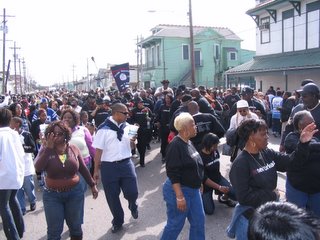
We can have this New Orleans, but we cannot have it unless we--the privileged few who have the resources to return and to rebuild--take it upon ourselves to help others. We can have this New Orleans if we recognize that those Others are Us.
...And so on and so forth (I'm tiring of the glossy rhetoric. I feel these days like a Speech is a Speech is a Speech, anyway.)
I'll say this: I moved to New Orleans partly because it IS a Chocolate City, and I'll stay only IF it remains one.
Monday, January 16, 2006
The topic of conversation these days is: "What do you think of the mayor's plan?" His plan is one that was released by the Bring New Orleans Back Committee last week and its most controversial element is a four-month moratorium on building permits in the city while neighborhoods are assessed for viability. It is the responsibility of the residents, themselves, to organize and lobby for funds and resources to be appropriated from federal funds following the four-month period. If residents prove their neighborhoods are "viable" (and no one seems to know what this means,) the city will consider its case as it goes about the next step of planning. The goal, it appears, is to reduce the city's "footprint," which will mean that homeowners and residents in certain parts of the city will have their property bought out by the federal government and then awarded to developers for "commercial or industrial use," or possible transformation into "parks and greenspace."
I don't know what I think about the mayor's plan, but I know I don't share the opinions of many of the business and homeowners who are now up in arms about the possibility of having to sell. To tell you the truth, I am SICK of hearing property owners talk about property rights. It would be one thing if these owners were refusing to sell or to budge in a rural area, but this is a CITY, and in order to sustain a city in the aftermath of severe devastation (and with a projected population just half of its previous size,) compromise is crucial. I am even more sick of listening to the city council members--all of whom object to the BNOB committee's plan, but NONE of whom has a better option to propose.
What I do know is that the racial tension in New Orleans continues to increase. Yesterday, Simon, Jackie, and I attended a second-line (a brass-band parade in which the participants are members of various "Social Aid and Pleasure Clubs" and the public, itself,) and for the first time since the storm, we, the whites, were outnumbered. It felt good. Like old times. But then I heard comments like, "They're trying to take our city," and, "White bitch better get out of my way," and I knew, I just knew, that this plan of the mayor's is going to exacerbate already-hot racial tensions in the city.
The problem is one that Sharon White, a woman from the Lower Ninth Ward who has been interviewed on NPR over the past several months, highlighted in her latest interview. She said that the members of the committee were "doctors and lawyers," and couldn't understand her neighborhood. She didn't say the members were white, but she didn't need to. The members of the committee ARE mostly white. And this is a real problem.
It is not that the committee members don't have the citizens' best interests in mind; the problem is the perception that because they are white, they don't care about the fates of the mostly-black residents whose futures they are considering. I think the committee f-ed up, big time, in not better incorporating the voices and opinions of the displaced and disenfranchised New Orleanians who were most heavily impacted by the storm. And now we will ALL pay for that mistake.
I remember going to my very first second-line, way back when, and knowing that it was really something special. It seemed like all of the racial tensions, the class tensions, didn't matter for a few hours. We all just danced, danced, danced.
Yesterday was no different, except this time, I heard comments that made me swallow and move on, move on. And then, later, it was different because shots broke out and three were injured.
When it happened, we were eating sandwiches near the Zulu club on Orleans, when suddenly, a crowd turned the corner, fear in their faces, sprinting toward us, toward Away, away. Jackie, Simon, and I crouched and pressed ourselves against the wall of the building behind us, trying to live and be out of harm's way.
And all of us, everyone, I think, just hoped and hoped and hoped that things would turn out differently than they had--that it would be the beginning of the parade again, and we would be dancing and celebrating our being together again, the evacuees, returned, wearing shirts that said, "ReNew Orleans," or matching outfits, or waving feathered plumes. We were nostalgic for a time that, maybe, in fact, never really was.
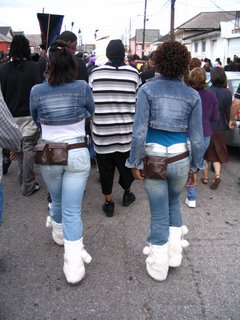
I don't know what I think about the mayor's plan, but I know I don't share the opinions of many of the business and homeowners who are now up in arms about the possibility of having to sell. To tell you the truth, I am SICK of hearing property owners talk about property rights. It would be one thing if these owners were refusing to sell or to budge in a rural area, but this is a CITY, and in order to sustain a city in the aftermath of severe devastation (and with a projected population just half of its previous size,) compromise is crucial. I am even more sick of listening to the city council members--all of whom object to the BNOB committee's plan, but NONE of whom has a better option to propose.
What I do know is that the racial tension in New Orleans continues to increase. Yesterday, Simon, Jackie, and I attended a second-line (a brass-band parade in which the participants are members of various "Social Aid and Pleasure Clubs" and the public, itself,) and for the first time since the storm, we, the whites, were outnumbered. It felt good. Like old times. But then I heard comments like, "They're trying to take our city," and, "White bitch better get out of my way," and I knew, I just knew, that this plan of the mayor's is going to exacerbate already-hot racial tensions in the city.
The problem is one that Sharon White, a woman from the Lower Ninth Ward who has been interviewed on NPR over the past several months, highlighted in her latest interview. She said that the members of the committee were "doctors and lawyers," and couldn't understand her neighborhood. She didn't say the members were white, but she didn't need to. The members of the committee ARE mostly white. And this is a real problem.
It is not that the committee members don't have the citizens' best interests in mind; the problem is the perception that because they are white, they don't care about the fates of the mostly-black residents whose futures they are considering. I think the committee f-ed up, big time, in not better incorporating the voices and opinions of the displaced and disenfranchised New Orleanians who were most heavily impacted by the storm. And now we will ALL pay for that mistake.
I remember going to my very first second-line, way back when, and knowing that it was really something special. It seemed like all of the racial tensions, the class tensions, didn't matter for a few hours. We all just danced, danced, danced.
Yesterday was no different, except this time, I heard comments that made me swallow and move on, move on. And then, later, it was different because shots broke out and three were injured.
When it happened, we were eating sandwiches near the Zulu club on Orleans, when suddenly, a crowd turned the corner, fear in their faces, sprinting toward us, toward Away, away. Jackie, Simon, and I crouched and pressed ourselves against the wall of the building behind us, trying to live and be out of harm's way.
And all of us, everyone, I think, just hoped and hoped and hoped that things would turn out differently than they had--that it would be the beginning of the parade again, and we would be dancing and celebrating our being together again, the evacuees, returned, wearing shirts that said, "ReNew Orleans," or matching outfits, or waving feathered plumes. We were nostalgic for a time that, maybe, in fact, never really was.

Friday, January 06, 2006
Once upon a time there was a lovely little truck that rolled through the neighborhood each day. Its driver was an old farmer of a man, who sang-song on a megaphone a list of his wares: "I got oranges and bananas! I got grapefruit! I got me-lons!" It was my morning alarm, and a sweet one at that. It made me roll around and stretch and yawn and smile to myself; it was that charming, the fruit man's truck. One time (and only one time,) I was awake when he drove by, and so I quickly got dressed and ran out to get some fruit, but he'd gone already. I ran four blocks to find him. I bought lemons. A strange choice, yes, but highly useful in one's cooking.
Now it is the American Red Cross truck that trolls the neighborhood every day, and it is a charmless, annoying thing to hear. I know I've mentioned this truck before, but you must know that this wretched vehicle accosts me daily. Its horn is identical to a cop's horn, and it stops just two houses down to announce over a loud speaker,(BRANK-BRAANNK!!) "THE AMERICAN RED CROSS HAS HOT MEALS AND WATER!" to contractors and workers and folks who, as far as I can tell, are just fine, thank you; perfectly okay.
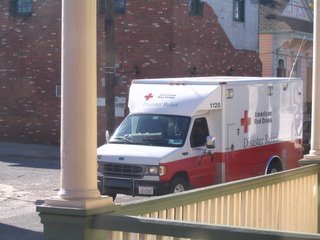
The ARC truck had its charm once, too, but that was months ago, when we had first returned--when stores weren't open and there was only one place on town to get gas; when everyone's refrigerator contained a fermented potion of eight weeks' worth of rot; when there was no gas to cook with, and often no electricity. Yes, even though we had money with which to feed outselves, one day, Simon ran out and got us a couple of ARC meals: formed chicken-part patties and canned peas floating in a puddle of green water; a hard roll; a sachet of mayonnaise. We were disappointed. When we'd worked as case workers at the ARC headquarters in Atlanta, the meals had been enormous catered affairs: one day a Mexican feast, the next, an elaborate BBQ spread. The meals the trucks here serve seem only to remind you that things here are far from normal. And now, so, too, do the trucks, themselves. Each day I hear that horn, that announcement over the loudspeaker, and I remember that this is a hurricane-ravaged city we're living in, folks!
I know that these meals are helping people in need, and that it is easy to criticize from a position of (relative) privilege, but I do wonder what the ARC volunteers think--feel--when they drive through our neighborhood: the beautiful (and intact) houses painted shades of Easter eggs; the residents with laptops using the local coffee shops' (all three of them) WiFi; the gay homeowners out sweeping the sidewalk to music piped from their remodeled homes; the "free living" punks cruising on their vintage bicycles to the next protest--do we seem to be in need? Do the volunteers feel, as I do, that their efforts are being misspent in our neighborhood, that we might, in fact, be better off if they left for areas that really were hard hit, or, in fact, if they left, altogether?
What we need is housing, jobs, and education, as a woman in charge of the Central City Community Council said the other night. We needed the food a long time ago, in those days immediately following the storm when the Red Cross was staying away, protecting its own. Now, it seems like a colossal waste of money--money given by the American people, who would, surely, agree that it should go to the areas of greatest need. The Marigny/Bywater is not one of those areas, and the trucks, these days, do little more than feed the otherwise well-fed, serve up a degree of Post-K novelty.
I have mentioned this before, but if you would like to give money to an organization (and we do, in fact, badly need your help,) please consider giving to another organization that is serving our current needs. Habitat's Operation Home Delivery is a good one. So is Common Ground. Or, you can check out a list of non-government organizations helping in the Katrina recovery effort. Most importantly, perhaps, is that you write letters and stay interested in what's happening here. You can start by signing a petition for levee board reform. Whatever you do, please, please DO it. I mean, I hope you find the blog, um, fun to read, and all, but I'm telling you what it's like to live here because I need you to help make it a more livable city.
Word.
Now it is the American Red Cross truck that trolls the neighborhood every day, and it is a charmless, annoying thing to hear. I know I've mentioned this truck before, but you must know that this wretched vehicle accosts me daily. Its horn is identical to a cop's horn, and it stops just two houses down to announce over a loud speaker,(BRANK-BRAANNK!!) "THE AMERICAN RED CROSS HAS HOT MEALS AND WATER!" to contractors and workers and folks who, as far as I can tell, are just fine, thank you; perfectly okay.

The ARC truck had its charm once, too, but that was months ago, when we had first returned--when stores weren't open and there was only one place on town to get gas; when everyone's refrigerator contained a fermented potion of eight weeks' worth of rot; when there was no gas to cook with, and often no electricity. Yes, even though we had money with which to feed outselves, one day, Simon ran out and got us a couple of ARC meals: formed chicken-part patties and canned peas floating in a puddle of green water; a hard roll; a sachet of mayonnaise. We were disappointed. When we'd worked as case workers at the ARC headquarters in Atlanta, the meals had been enormous catered affairs: one day a Mexican feast, the next, an elaborate BBQ spread. The meals the trucks here serve seem only to remind you that things here are far from normal. And now, so, too, do the trucks, themselves. Each day I hear that horn, that announcement over the loudspeaker, and I remember that this is a hurricane-ravaged city we're living in, folks!
I know that these meals are helping people in need, and that it is easy to criticize from a position of (relative) privilege, but I do wonder what the ARC volunteers think--feel--when they drive through our neighborhood: the beautiful (and intact) houses painted shades of Easter eggs; the residents with laptops using the local coffee shops' (all three of them) WiFi; the gay homeowners out sweeping the sidewalk to music piped from their remodeled homes; the "free living" punks cruising on their vintage bicycles to the next protest--do we seem to be in need? Do the volunteers feel, as I do, that their efforts are being misspent in our neighborhood, that we might, in fact, be better off if they left for areas that really were hard hit, or, in fact, if they left, altogether?
What we need is housing, jobs, and education, as a woman in charge of the Central City Community Council said the other night. We needed the food a long time ago, in those days immediately following the storm when the Red Cross was staying away, protecting its own. Now, it seems like a colossal waste of money--money given by the American people, who would, surely, agree that it should go to the areas of greatest need. The Marigny/Bywater is not one of those areas, and the trucks, these days, do little more than feed the otherwise well-fed, serve up a degree of Post-K novelty.
I have mentioned this before, but if you would like to give money to an organization (and we do, in fact, badly need your help,) please consider giving to another organization that is serving our current needs. Habitat's Operation Home Delivery is a good one. So is Common Ground. Or, you can check out a list of non-government organizations helping in the Katrina recovery effort. Most importantly, perhaps, is that you write letters and stay interested in what's happening here. You can start by signing a petition for levee board reform. Whatever you do, please, please DO it. I mean, I hope you find the blog, um, fun to read, and all, but I'm telling you what it's like to live here because I need you to help make it a more livable city.
Word.
Monday, January 02, 2006
Happy New Year
The holidays have passed, taking with them any excuse I may have had for my loafing around, reading, and generally being useless. I remember once upon a time, in those harrowing first weeks after the storm, I planned to do Great Things. I would come back and volunteer and clean up and work, work, work like crazy to get this city that I love so much back on its feet. Instead, I find that I am suffering with a bad case of the blues, and like many other New Orleanians who have returned, I deal with this by a) sleeping too much b) fawning over my cats c) contemplating writing (and rarely doing it) and d) drinking at least a few times a week.
 Now, lest my mother read this and begin to worry that I am showing symptoms of those addictive D__-genes in my family, let me say that I am not an alcoholic (seriously, I mean it,) and that, all things considered, a little bit of the blues is to be expected. I wouldn’t call it, “Wigging Out,” as this article does, but one does get the feeling that one has gone a tiny bit crazy when one lives in a Post-Katrina New Orleans.
Now, lest my mother read this and begin to worry that I am showing symptoms of those addictive D__-genes in my family, let me say that I am not an alcoholic (seriously, I mean it,) and that, all things considered, a little bit of the blues is to be expected. I wouldn’t call it, “Wigging Out,” as this article does, but one does get the feeling that one has gone a tiny bit crazy when one lives in a Post-Katrina New Orleans.
Luckily we are in our home, which, while mostly undamaged, does appear to have taken some water, which I discovered while cleaning behind the toilet in our bathroom. A strange brownish-gray film, much like the one that covers, well, everything, in other neighborhoods of NOLA, covered the back corner of the toilet’s pedestal. I wiped it, and, uh, smelled it, and it had that unmistakable and indescribable odor that has become so familiar. Upon closer inspection, I discovered a brown line, almost the color of a tea stain, along the baseboard. It wasn’t the same kind of watermark that you see all over New Orleans, and I don’t think the water stayed in the bathroom or kitchen, but it appears that when the levees first broke, the water did, in fact, at least leak into our kitchen and bathroom. I will need to tell our landlords about this, but decided to wait until after the holiday, primarily because it seemed an exhausting task, at the time, to tell them that the house did, in fact, receive damage, and now, well, it seems no less exhausting.
I guess that’s the thing: everything makes me tired. Even talking to our dear neighborhood friend, Terence, who has been living in an apartment in Houston with his mother and brother, who has no young friends to play with, who doesn’t know what will happen next, and who asks me whenever we talk if I’ve talked to his friend, Jabari, whom I haven’t seen since the storm, or his neighbor, Miss Theresa, whom I also haven’t seen since before the storm—even talking to Terence feels like a chore. A family friend of theirs who attended church with them has been in contact with us about finding a place for them to live. Libba says we are “saving Terence’s life,” by helping them, but we have found only one landlord willing to deal with Section 8, and that home, too, is really too expensive for a single mother working in a bakery to afford.
I told my mother when I was back in Atlanta for the holiday that to me the hardest bit is not having a concentrated place to focus my grief. It is not just the survivor’s guilt that gets me, but the mental exhaustion that comes with feeling the collective grief of everyone else—of people who lost everything, of children like Terence who spent Christmas in a strange place and undoubtedly with very little cheer. Those who lost their homes can mourn that loss, but for those of us who still have (in the technical sense) everything, we don’t know what to mourn; we mourn everything. Oh, my word, it sucks.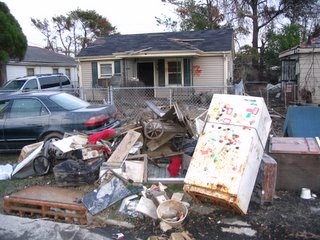
But here’s what sucks even more:
While we were at the annual Christmas Eve party thrown by family friends in Atlanta, a couple I’d never met before asked about New Orleans. What was it like to be back, they wanted to know. What were our plans for the future? These are not easy questions to answer, and they are even more difficult to answer when it turns out that your audience thinks that New Orleans shouldn’t be rebuilt, or at least “not with my tax dollars.” I wanted to say how I felt the same way about the war in Iraq, but something—was it my being gracious or cowardly—made me bite my tongue. I did speak up when Mrs. So-and-conservative-so took on the tone of Barbara Bush. “Those people,” she said, didn’t own their homes in the first place, and “they” were better off starting new lives elsewhere.
“Actually,” I said, “seventy-five percent of ‘those people’ in the lower ninth ward owned their homes—a far greater percentage than in other neighborhoods of New Orleans.”
“Oh, really?” said she, not looking at me (did she ever look at me? Was she afraid, perhaps, that doing so might require that she show a bit of empathy?)
I excused myself.
I wound up showing a slide show while reading the “Night Before Christmas” that my friend and colleague, Stephany Lyman wrote. It made me and those who had hearts (i.e. everyone except the bitch who sat with me at dinner) cry. I cried, too, while the Prayers of the People were read at the church I attended as a child. Someone mentioned “those who have suffered loss from natural disaster,” and oh, how my floodgates a-let loose!
After being spoiled by my parents and a night of bowling with friends, Simon and I headed back to New Orleans for the New Year. Jeremy Lyons and Greg Schatz were in town, and it was great to talk to them and to sing with Schatzy on New Year’s Eve. Both Greg and Jeremy talked about wanting to come back, but for the time being they are where they are. Jeremy, his wife Valerie, and their daughter, Lucy, are living outside of Boston. The home they rented in Mid-City was flooded and they are waiting to see what will happen next. Jeremy said that he had always thought that he was one of the more conservative New Orleanians, but that everywhere else he goes, no matter how left-wing or liberal, he just feels different, somehow. Greg said a bit of the same and talked about his reluctant residency in New York. I was glad to talk to musicians who felt an innate loyalty to New Orleans, as I do.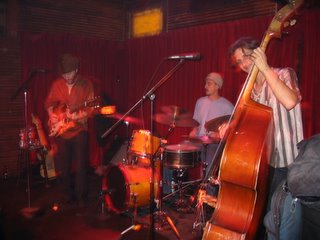
After the Schatzy gig at d.b.a, we went to the bonfires on the levee in Mid-City—an event that has occurred for decades, as I understand it, and we added our dried-up Christmas Tree to the pile that was ignited at midnight. The police and fireman presence was huge, but they let us be until the trees burnt themselves out, and I watched as friends ran in circles around the fire, gleefully, with abandon. The fire and policemen, even, seemed to be having a good time. There were kids there, too, and fireworks and sparklers and lots of fog—our Southern snow—that made the atmosphere even more, uh, magical. It was good, then, to be home.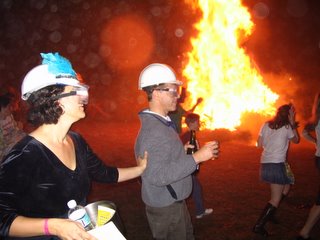
 Now, lest my mother read this and begin to worry that I am showing symptoms of those addictive D__-genes in my family, let me say that I am not an alcoholic (seriously, I mean it,) and that, all things considered, a little bit of the blues is to be expected. I wouldn’t call it, “Wigging Out,” as this article does, but one does get the feeling that one has gone a tiny bit crazy when one lives in a Post-Katrina New Orleans.
Now, lest my mother read this and begin to worry that I am showing symptoms of those addictive D__-genes in my family, let me say that I am not an alcoholic (seriously, I mean it,) and that, all things considered, a little bit of the blues is to be expected. I wouldn’t call it, “Wigging Out,” as this article does, but one does get the feeling that one has gone a tiny bit crazy when one lives in a Post-Katrina New Orleans.Luckily we are in our home, which, while mostly undamaged, does appear to have taken some water, which I discovered while cleaning behind the toilet in our bathroom. A strange brownish-gray film, much like the one that covers, well, everything, in other neighborhoods of NOLA, covered the back corner of the toilet’s pedestal. I wiped it, and, uh, smelled it, and it had that unmistakable and indescribable odor that has become so familiar. Upon closer inspection, I discovered a brown line, almost the color of a tea stain, along the baseboard. It wasn’t the same kind of watermark that you see all over New Orleans, and I don’t think the water stayed in the bathroom or kitchen, but it appears that when the levees first broke, the water did, in fact, at least leak into our kitchen and bathroom. I will need to tell our landlords about this, but decided to wait until after the holiday, primarily because it seemed an exhausting task, at the time, to tell them that the house did, in fact, receive damage, and now, well, it seems no less exhausting.
I guess that’s the thing: everything makes me tired. Even talking to our dear neighborhood friend, Terence, who has been living in an apartment in Houston with his mother and brother, who has no young friends to play with, who doesn’t know what will happen next, and who asks me whenever we talk if I’ve talked to his friend, Jabari, whom I haven’t seen since the storm, or his neighbor, Miss Theresa, whom I also haven’t seen since before the storm—even talking to Terence feels like a chore. A family friend of theirs who attended church with them has been in contact with us about finding a place for them to live. Libba says we are “saving Terence’s life,” by helping them, but we have found only one landlord willing to deal with Section 8, and that home, too, is really too expensive for a single mother working in a bakery to afford.
I told my mother when I was back in Atlanta for the holiday that to me the hardest bit is not having a concentrated place to focus my grief. It is not just the survivor’s guilt that gets me, but the mental exhaustion that comes with feeling the collective grief of everyone else—of people who lost everything, of children like Terence who spent Christmas in a strange place and undoubtedly with very little cheer. Those who lost their homes can mourn that loss, but for those of us who still have (in the technical sense) everything, we don’t know what to mourn; we mourn everything. Oh, my word, it sucks.

But here’s what sucks even more:
While we were at the annual Christmas Eve party thrown by family friends in Atlanta, a couple I’d never met before asked about New Orleans. What was it like to be back, they wanted to know. What were our plans for the future? These are not easy questions to answer, and they are even more difficult to answer when it turns out that your audience thinks that New Orleans shouldn’t be rebuilt, or at least “not with my tax dollars.” I wanted to say how I felt the same way about the war in Iraq, but something—was it my being gracious or cowardly—made me bite my tongue. I did speak up when Mrs. So-and-conservative-so took on the tone of Barbara Bush. “Those people,” she said, didn’t own their homes in the first place, and “they” were better off starting new lives elsewhere.
“Actually,” I said, “seventy-five percent of ‘those people’ in the lower ninth ward owned their homes—a far greater percentage than in other neighborhoods of New Orleans.”
“Oh, really?” said she, not looking at me (did she ever look at me? Was she afraid, perhaps, that doing so might require that she show a bit of empathy?)
I excused myself.
I wound up showing a slide show while reading the “Night Before Christmas” that my friend and colleague, Stephany Lyman wrote. It made me and those who had hearts (i.e. everyone except the bitch who sat with me at dinner) cry. I cried, too, while the Prayers of the People were read at the church I attended as a child. Someone mentioned “those who have suffered loss from natural disaster,” and oh, how my floodgates a-let loose!
After being spoiled by my parents and a night of bowling with friends, Simon and I headed back to New Orleans for the New Year. Jeremy Lyons and Greg Schatz were in town, and it was great to talk to them and to sing with Schatzy on New Year’s Eve. Both Greg and Jeremy talked about wanting to come back, but for the time being they are where they are. Jeremy, his wife Valerie, and their daughter, Lucy, are living outside of Boston. The home they rented in Mid-City was flooded and they are waiting to see what will happen next. Jeremy said that he had always thought that he was one of the more conservative New Orleanians, but that everywhere else he goes, no matter how left-wing or liberal, he just feels different, somehow. Greg said a bit of the same and talked about his reluctant residency in New York. I was glad to talk to musicians who felt an innate loyalty to New Orleans, as I do.

After the Schatzy gig at d.b.a, we went to the bonfires on the levee in Mid-City—an event that has occurred for decades, as I understand it, and we added our dried-up Christmas Tree to the pile that was ignited at midnight. The police and fireman presence was huge, but they let us be until the trees burnt themselves out, and I watched as friends ran in circles around the fire, gleefully, with abandon. The fire and policemen, even, seemed to be having a good time. There were kids there, too, and fireworks and sparklers and lots of fog—our Southern snow—that made the atmosphere even more, uh, magical. It was good, then, to be home.

Subscribe to:
Posts (Atom)
